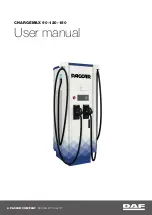
Inspecting Your Tires and Wheel Valve
Stems
Periodically inspect the tire treads for
uneven or excessive wear and remove
objects such as stones, nails or glass that
may be wedged in the tread grooves.
Check the tire and valve stems for holes,
cracks, or cuts that may permit air leakage
and repair or replace the tire and replace
the valve stem. Inspect the tire sidewalls
for cracking, cuts, bruises and other signs
of damage or excessive wear. If internal
damage to the tire is suspected, have the
tire demounted and inspected in case it
needs to be repaired or replaced. For your
safety, tires that are damaged or show
signs of excessive wear should not be used
because they are more likely to blow out
or fail.
Improper or inadequate vehicle
maintenance can cause tires to wear
abnormally. Inspect all your tires, including
the spare, frequently, and replace them if
one or more of the following conditions
exist:
Tire Wear
E142546
Tire wear indicators are moulded in to the
bottom of the tread grooves to aid in
determining when to replace the tire. Tires
should be replaced before the tread wears
down to the same height as the wear
indicators.
Damage
Periodically inspect the tire treads and
sidewalls for damage (such as bulges in
the tread or sidewalls, cracks in the tread
groove and separation in the tread or
sidewall). If damage is observed or
suspected have the tire inspected by a tire
professional. Tires can be damaged during
off-road use, so inspection after off-road
use is also recommended.
Age
WARNING
Tires degrade over time depending
on many factors such as weather,
storage conditions, and conditions
of use (load, speed, inflation pressure) the
tires experience throughout their lives.
In general, tires should be replaced after
six years regardless of tread wear.
However, heat caused by hot climates or
frequent high loading conditions can
accelerate the aging process and may
require tires to be replaced more
frequently.
You should replace your spare tire when
you replace the road tires or after six years
due to aging even if it has not been used.
Tire Replacement Requirements
Your vehicle is equipped with tires
designed to provide a safe ride and
handling capability.
WARNINGS
Only use replacement tires and
wheels that are the same size, load
index, speed rating and type (such
as P-metric versus LT-metric or all-season
versus all-terrain) as those originally
provided by Ford. The recommended tire
and wheel size may be found on the Tire
Label. Refer to See
251
Ranger (), EB3B-19G219-ZAB enAUS
Wheels and Tires
















































